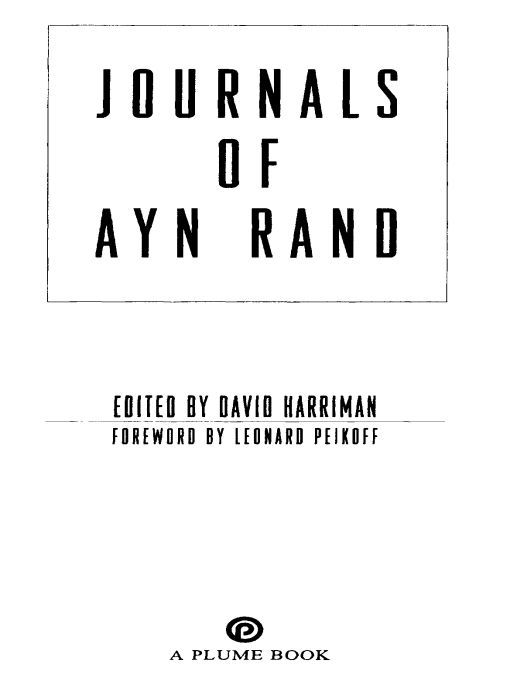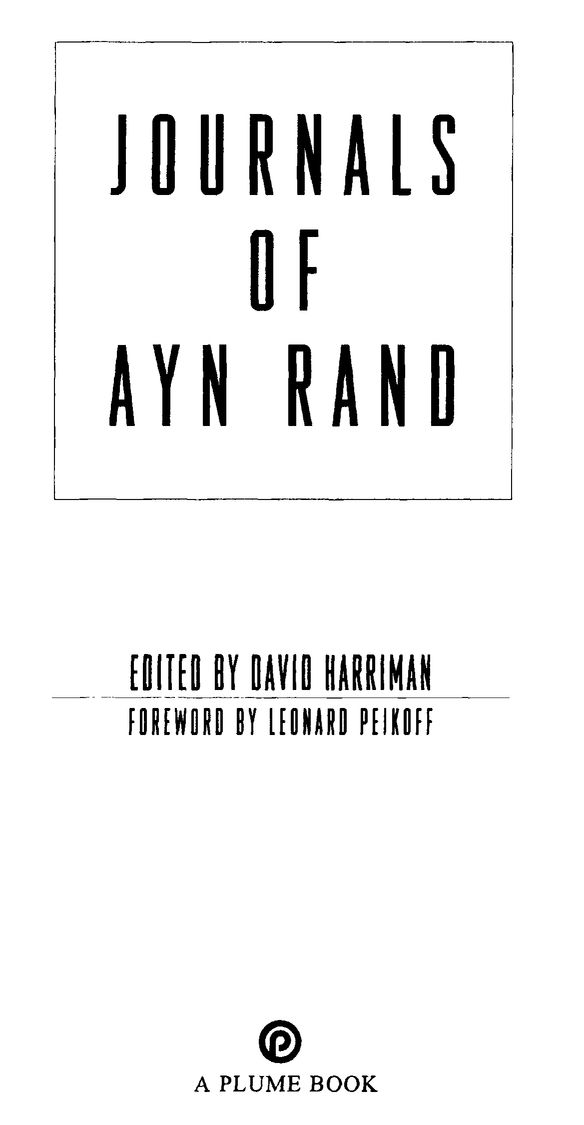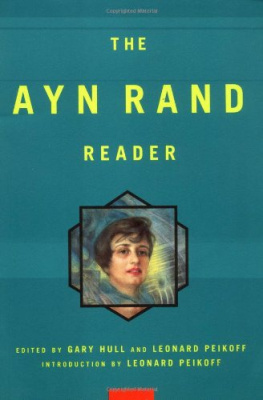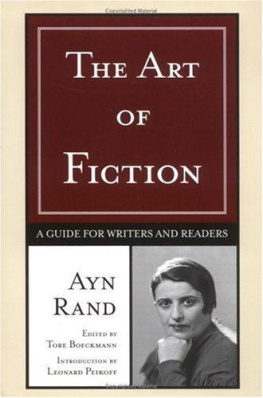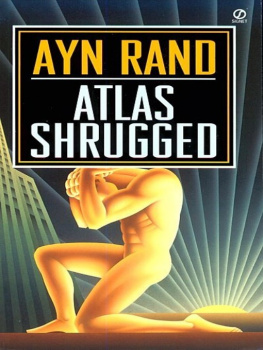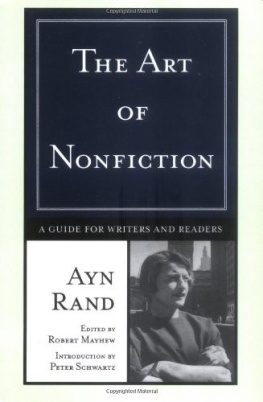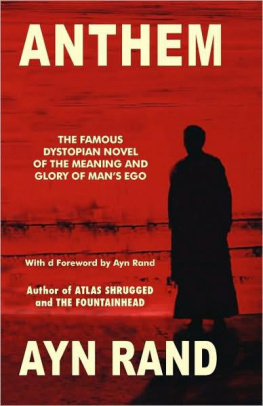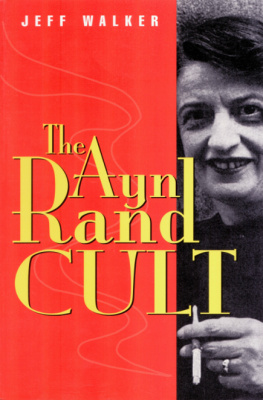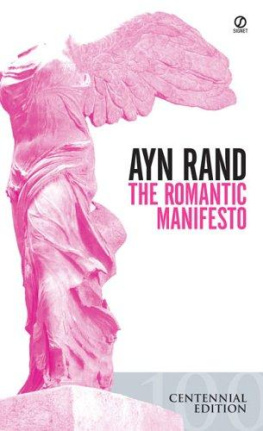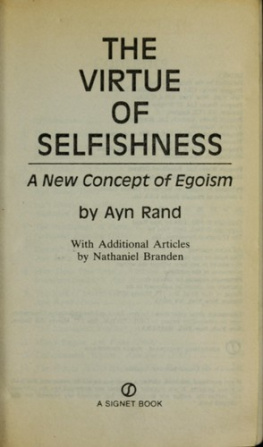Table of Contents
Journals is a treat to read, because it is the raw evidence of Ayn Rands continuous growth across fifty yearsher growth both as a philosopher and as an artist ...
We see the steps by which she [created her novels]we are there when a dramatic event or scene first occurs to her, and we see what she finally does with it and why ... We see how Ayn Rand uses (or deliberately does not use) her knowledge of real people. This last will answer such common questions as: Was Frank Lloyd Wright a model for Roark? Or William Randolph Hearst for Wynand? It will also answer some uncommon questions, such as: What female suggested Lois Cook? What scientist Robert Stadler? And what president Mr. Thompson?
-LEONARD PEIKOFF
LEONARD PEIKOFF is universally recognized as the worlds premier Ayn Rand scholar. He worked closely with Rand for thirty years and was designated by her as heir to her estate. He has taught philosophy at Hunter College and New York University. Dr. Peikoffs books include The Ominous Parallels and Objectivism: The Philosophy of Ayn Rand. He is also co-editor of The Ayn Rand Reader, available in a Plume edition. For further information, you can go to his website, alshow com.
DAVID HARRIMAN has M.S. degrees in both physics and philosophy. He has taught philosophy at California State University, San Bernardino, and is working on a book on the philosophy of physics. He has worked with Leonard Peikoff for several years.
FOREWORD DY LEONARD PEIKOFF
Ayn Rands Journalsmy name for her notes to herself through the decadesis the bulk of her still unpublished work, arranged chronologically. What remains to be published are two lecture courses on writing, presently being edited, and her old film scripts.
The Journals contains most of ARs notes for her three main novelsalong with some early material, some notes made between The Fountainhead and Atlas Shrugged, and some notes from her final decades. The early material includes, among other things, ARs first philosophic musings on paper in English, written in her twenties. The middle section includes a fascinating transitional statement of her ethics, never finished, and also a vigorous essay on why the House Un-American Activities Committee in 1947 did not violate the civil rights of the Hollywood Communists. The final section includes the notes for ARs last projected novel, To Lorne Dieterling.
Some pieces important to this volume have been lost. I refer to eight or ten scenarios for the silent screen, written in the twenties. These stories, several pages apiece, featured strong heroes, a passionate love interest, and non-stop action, often set in exotic locales; they exemplified an extravagant romanticism bubbling over with the excitement of living. I first came upon these scenarios in the eighties, after ARs death. Had I been able to include them here, they would have brought a sorely needed balance to some other items, such as The Little Street, a bitter novelette from the same period. Mysteriously, these scenarios have disappeared from the Estate warehouse. If they should reappear, I promise to publish them.
Aside from occasional pieces, identified by the editor, the AR material in this book was written for herself, for her own clarity. No one, apart from her husband and a few associates, was ever shown any of this material, nor did AR intend to publish it. Obviously, therefore, nothing in the book may be taken as definitive of her ideas. On the contrary, most of these preliminary formulations were dropped, and a few were even contradicted, in her published works. In several cases, though hardly in all, the editor points out such discrepancies.
The art of writing, AR wrote in a November 1944 note, is the art of doing what you think youre doing. This is not as simple as it sounds. It implies a very difficult undertaking: the necessity to think. And it implies the requirement to think out three separate, very hard problems: What is it you want to say? How are you going to say it? Have you really said it? It was to answer these questions that most of the Journals was written. In other words, the notes are nothing more than AR preparing herself to write by thinking aloud on paperin random snatches, as and when she sought to clarify a pointwithout outline, structure, continuous theme, or editorial polish.
Despite its unedited character, however, the Journals is a treat to read, because it is the raw evidence of ARs continuous growth across fifty yearsher growth both as a philosopher and as an artist.
One can see her growth as a philosopher in two ways: in her interests and in her ideas, i.e., in regard both to depth and to truth.
ARs mind moved systematically from politics (as a youth) to ethics (in her thirties and forties) to epistemology and metaphysics (in her fifties and later). This progression is not a mere change of interest, but a true organic development: the earlier stages increasingly exhibit the maturity of what is to come, which in turn always remains faithful in principle to its youthful origins. One great pleasure in reading the book is to see hints of later discoveries mentioned at first casually, even parenthetically. For instance, if you read ARs first philosophic musings with an eye to Atlas Shrugged, you will observe how much more you can see in her words now, thanks to her, than she herself could see at the time. Her distinctive ideas were present from her start as a thinker; they were implicit in her fundamental approach at least from the age of twelve. It was only a matter of time and logic until she was able to identify them explicitly.
The best evidence of ARs increasing depth is her unpublished manuscript The Moral Basis of Individualism. It is there that we see her evolution from The Fountainheads stress on independence to Atlas Shruggeds recognition that the basic virtue is rationality, of which independence is but an aspect. We also see her taking the historic step from ethics to the base of philosophy. Traditionally, philosophers started their books on ethics by asking: What is the proper moral code? AR started there, toountil something occurred to her one day in mid-sentence: Chapter 1 should begin by stating the [moral] axiom. Then define mans nature. Then ask [these two words are deleted] Orbegin by asking whether a moral code is necessary? Prove that it isfor a rational being. What is the rational? That which is true to facts.... In regard to this passage I am tempted to paraphrase the mystics: To those who understand, no explanation is necessary; to those who do not, read Galts speech.
In regard to the content of her ideas, AR also underwent an organic development as, step by step, she gained clarity about the full implications of her fundamental premises.
ARs first notes reveal an influence of Nietzsche, in the form of droplets of subjectivism, and of the idea that the heroes among men are innately great, as against the inherently corrupt masses, who deserve only bitterness and domination from their superiors. None of this is stated as a connected position, but such ideas do show up here and there.
It is instructive to watch these dropletsevery one of themevaporate without residue, as ARs own principles emerge into the sunshine of explicit statement; it is a perfect example of science (reason) functioning as a self-corrective. After she comes to define reason, subjectivism vanishes; after her analysis of individual rights, domination is gone; after she grasps the nature of volition, she says no more about innate stature.

